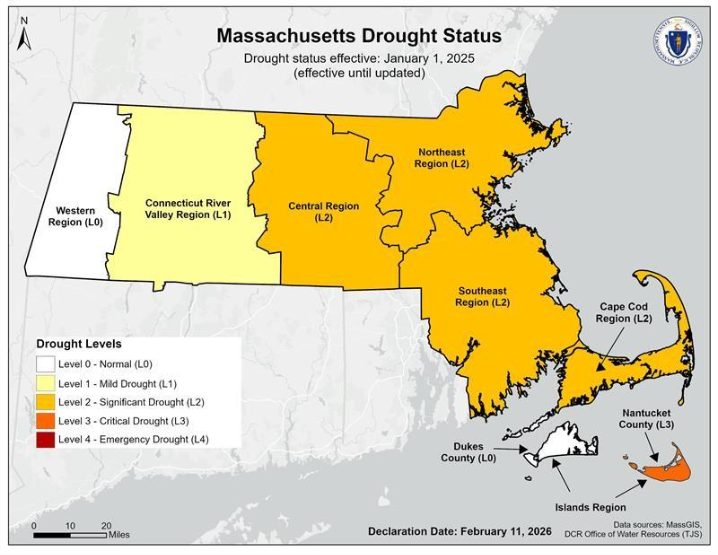Massachusetts Irrigation Program
Massachusetts Drought Status
The Massachusetts drought status map has designated regions with Aquarion water systems in Level 2 - Significant Drought. Let's use our water resources wisely to ensure adequate supplies for drinking, fire protection, and overall public health. Mandatory, nonessential outdoor water use restrictions are in effect in most systems.

Aquarion Water Systems with Nonessential Outdoor Water Use Restrictions
For Millbury and Oxford Customers
Drought Level - Level 2 Significant Drought
All nonessential outdoor water uses are banned, except that watering of ornamentals and flower gardens with drip irrigation, hand-hold hose or watering cans may be permitted.
For Dover (Including Springdale Farms) and Ponds of Plymouth Customers
Drought Level - Level 2 Significant Drought
- Nonessential outdoor water use is allowed one day per week before 9:00 am and after 5:00 pm (see FAQs below for details)
- Assigned day:
- Even number homes (last digit of your address - 0,2,4,6 or 8) and no address number homes – Sunday
- Odd number homes (last digit of your address - 1,3,5,7 or 9) – Saturday
For Pinehills Customers
Drought Level - Level 2 Significant Drought
- Nonessential outdoor water use is allowed two days per week before 7:00 am and after 7:00 pm (see FAQs below for details)
- Assigned days:
- Even number homes (last digit of your address - 0,2,4,6 or 8) and no address number homes – Sunday and Wednesday
- Odd number homes (last digit of your address - 1,3,5,7 or 9) – Saturday and Tuesday
Frequently Asked Questions (FAQs)
- irrigation of lawns via sprinklers or automatic irrigation systems;
- washing of vehicles, except in a commercial car wash or as necessary for operator safety; and
- washing of exterior building surfaces, parking lots, driveways or sidewalks, except as necessary to apply surface treatments such as paint, preservatives, stucco, pavement, or cement.
Water uses NOT subject to mandatory restrictions include essential watering activities:
- for health or safety reasons, including public facilities used for cooling such as splash pads and swimming pools, and for washing of boats, engines, or marine equipment to prevent negative saltwater impacts or the transfer of invasive aquatic species;
- by permit, license, statute or regulation;
- for the production of food, including vegetable gardens, and fiber;
- for the maintenance of livestock;
- to meet the core functions (those functions essential to the commercial operations) of a business, including but not limited to:
- plant nurseries as necessary to maintain stock;
- golf courses as necessary to maintain greens and tees, and limited fairway watering per 310 CMR 36.07(2)(c)2.a. through c.;
- venues used for weddings or similar special events that limit watering to hand-held hose or drip irrigation as necessary to maintain gardens, flowers and ornamental plants;
- professional washing of exterior building surfaces, parking lots, driveways and/or sidewalks as necessary to apply surface treatments such as paint, preservatives, stucco, pavement, or cement in the course of construction, reconstruction or renovation work;
- for irrigation of public parks before 9:00 a.m. and after 5:00 p.m.,
- for irrigation of public and private recreation fields, including those operated by schools, colleges, universities, and athletic associations, before 9:00 a.m. and after 5:00 p.m.,
- for irrigation of publicly-funded shade trees and trees in the public right-of-way; or
- to establish a new lawn as necessary to stabilize soil in response to new construction or following the repair or replacement of a Title 5 system.
- watering of ornamentals and flower gardens with drip irrigation, hand-held hose, or watering can.
- irrigation to establish a new lawn and new plantings during the months of May and September;
- irrigation of public parks and recreational fields by means of automatic sprinklers outside the hours
- of 9 am to 5 pm; and
- irrigation of lawns, gardens, flowers and ornamental plants by means of a hand-held hose.
- other water uses NOT subject to mandatory restrictions include essential watering activities:
- for health or safety reasons;
- by regulation;
- for the maintenance of livestock; or
- to meet the core functions of a business (for example, irrigation by golf courses as necessary to
- maintain tees, greens, and limited fairway watering, or irrigation by plant nurseries as necessary to
- maintain stock).
Through the Water Management Act, MassDEP regulates the amount of water that all water suppliers in Massachusetts can withdraw from the environment from its sources (e.g. wells). The irrigation schedule will help ensure that our water systems are in compliance
with the WMA permit limits and requirements.
Visit http://www.nsrwa.org/watersmart/greenscapes/ for tips on lawn and garden care. According to Greenscapes:
- Grass grows the deepest and healthiest roots with infrequent watering.
- Watering two days a week is more than adequate to have a beautiful lawn. In fact, research has shown that grass thrives with about an inch of rain a week - some supplied by Mother Nature and the rest by just one watering.
You can also visit our Lawn and Garden Irrigation Tips page.
Tips for Watering Your Lawn and Garden
Landscapes can thrive with water twice a week or even less.
Learn More